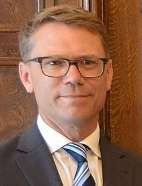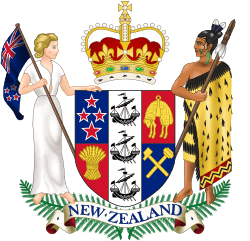Paul Goldsmith (politician)
Paul Jonathan Goldsmith (born 1971) is a New Zealand politician and, since the 2011 election, a list member of the New Zealand House of Representatives. He is a member of the National Party.
Paul Goldsmith MP | |
|---|---|
 | |
| Member of the New Zealand Parliament for National Party list | |
| Assumed office 26 November 2011 | |
| 25th Minister for Science and Innovation | |
| In office 20 December 2016 – 26 October 2017 | |
| Prime Minister | Bill English |
| Preceded by | Steven Joyce |
| Succeeded by | Megan Woods |
| Minister for Tertiary Education, Skills and Employment | |
| In office 20 December 2016 – 26 October 2017 | |
| Prime Minister | Bill English |
| Preceded by | Steven Joyce |
| Succeeded by | Portfolio Disestablished |
| 11th Minister of Commerce and Consumer Affairs | |
| In office 8 October 2014 – 20 December 2016 | |
| Prime Minister | John Key Bill English |
| Preceded by | Craig Foss |
| Succeeded by | Jacqui Dean |
| Personal details | |
| Born | 1971 (age 48–49) Auckland |
| Political party | National Party |
Early life
Goldsmith was born in 1971 in the Auckland suburb of Mount Eden. He descends from Charles George Goldsmith, a migrant from Liverpool who settled in the East Cape area early in New Zealand's colonial history. Charles Goldsmith had four wives—two Māori (Ngāti Porou), and two pākehā—fathering 16 children. However Goldsmith has clarified that he is not himself of Māori descent.[1]
Goldsmith attended Auckland Grammar School and the University of Auckland.[2] Goldsmith then worked as a press secretary and speech writer for Phil Goff (Labour), Simon Upton (National) and John Banks (then a National MP).[3] In 2000 Goldsmith became a public relations adviser and worked for Tranz Rail and the University of Auckland.[3]
Goldsmith graduated with an MA in history.[2] He has written the biographies of John Banks, Don Brash, William Gallagher, Alan Gibbs and Te Hemara Tauhia as well as a history of taxes, Puketutu Island and a history of the Fletcher Building construction company.[3]
Don Brash biography
At the launch of the Don Brash biography, Brash: A Biography, Goldsmith assured Danya Levy of the New Zealand Press Association that the book "was not commissioned by the National Party" and that it was his own initiative, but written with Brash's co-operation.[4]
But as investigative journalist Nicky Hager in his book The Hollow Men revealed, it was indeed commissioned by the National Party, and was in fact the party's first big budget item in the 2005 election campaign.[5] Hager quotes a 21 May 2004 email from Brash to Richard Long, who was his chief of staff,[6] where a proposal from Christchurch publisher Willson Scott for the biography was discussed. Long replied two days later that he had discussed the book with Goldsmith, and Brash in reply wanted political historian Michael Bassett [a personal friend of Brash] to be considered,[7] [8]
The book was eventually commissioned with Goldsmith, and was paid for by National Party donors through a company called Silverbeat, which belonged to Brash's assistant Bryan Sinclair.[9] National Party staff supplied Goldsmith with a collections of papers for the book, and Goldsmith first interviewed Brash in July 2004.[10] Within weeks, Goldsmith supplied the first drafts to National Party staff, and the book was written in such a complimentary way that Brash commented on the final chapter: "I do not have a single word I would change". The working relationship with Brash got so close that Goldsmith even got to review a draft version of Brash's second Orewa Speech (dubbed Orewa 2); Goldsmith returned his draft to Brash on 10 November 2004, and some of the lines were kept for 25 January 2005 speech delivery.[11]
Whilst the book was under production, Brash's team of advisers strategised how the biography could be used to best effect, or "as a significant marketing tool", as Brash himself called it in a 27 March 2005 email.[12] To give the impression that the book was independently written was made more complicated by Goldsmith becoming a candidate in the Maungakiekie electorate during the book production, something that Long had advised against by stating that he had "warned the party and Goldsmith months ago that his candidacy would undermine the authority of the book and [he] urged him to hold off till next time".[13]
The biography was launched on 28 February 2005 in Auckland. Although it was nominally a project by the publisher Penguin Books,[14] all arrangements for the launch were made by Sinclair. From a 15 February email from Goldsmith to Sinclair that contained a draft invite list that have four National Party donors listed immediately after Goldsmith's family but before his friends and with specific reference to "the above 4 ... need courtesy to invite", Hager thinks that it is possible that Doug Myers, Alan Gibbs, Craig Heatley, and David Richwhite were the ones who paid for the production of the biography. As such, the production costs of the biography do not form part of the election costs declared by the National Party for the 2005 campaign.[15]
Member of Parliament
| New Zealand Parliament | ||||
| Years | Term | Electorate | List | Party |
| 2011–2014 | 50th | List | 39 | National |
| 2014–2017 | 51st | List | 30 | National |
| 2017–present | 52nd | List | 18 | National |
Goldsmith contested the Maungakiekie electorate in the 2005 general election for the National Party.[3] He was defeated by the incumbent, Labour's Mark Gosche, and due to his low list placing (59 on the National Party list),[3] he did not enter Parliament.[16]
He successfully stood for the Auckland City Council in the 2007 local body elections. He was appointed deputy finance chairman by Mayor John Banks and chaired the community services committee.[3][17]
He stood for Citizens & Ratepayers in the Albert-Eden-Roskill ward at the 2010 Auckland elections but placed third after Christine Fletcher and Cathy Casey in the two-member ward.[17]
Goldsmith stood in the Epsom electorate at the 2011 general election,[18] but lost the electorate vote to John Banks, who earlier in 2011 had joined ACT New Zealand.[19]
Goldsmith was ranked 39th on the National Party list[20] and was elected as a list MP sitting in the 50th Parliament.[21]
Goldsmith was then ranked 30th on the National Party list, and was re-elected as a list MP in the 2014 election to the 51st Parliament. He was a Cabinet Minister in the 5th National Government, holding the portfolios of Science and Innovation, Tertiary Education, Skills and Employment, and Regulatory Reform.[22]
Since 25 March 2020, Goldsmith has been a member of the Epidemic Response Committee, a select committee that considers the government's response to the COVID-19 pandemic.[23]
Private life
Goldsmith is married with four children.[2] He is a 2nd dan black belt in Tae Kwon Do.[3]
Bibliography
- Goldsmith, Paul (2002). John Banks: A Biography. Penguin Books. ISBN 0-14-301819-1.
- Goldsmith, Paul (2003). The Rise and Fall of Te Hemara Tauhia. Raupo Publishing. ISBN 0-7-90009-056.
- Goldsmith, Paul (2005). Brash: a biography. Penguin Books. ISBN 0-14-301967-8.
- Goldsmith, Paul and Bassett, Michael, The Myers, David Ling Publishing Ltd, Auckland, 2007.
- Goldsmith, Paul (2008). We Won, You Lost, Eat That!: A Political History of Tax in New Zealand Since 1840. David Ling Publishing. ISBN 1-877378-22-4.
- Goldsmith, Paul (2008). Stress & Enterprise: the Career of Richard Izard. David Ling Publishing. ISBN 978-1-87737-821-8.
- Goldsmith, Paul; Bassett, Michael (2008). Puketutu and its People. David Ling Publishing. ISBN 978-1-87737-825-6.
- Goldsmith, Paul (2009). Fletchers: A Centennial History of Fletcher Building. David Ling Publishing. ISBN 1-877378-35-6.
- Goldsmith, Paul (2012). Serious Fun: The Life and Times of Alan Gibbs. Penguin Books New Zealand. ISBN 978-1-86979-930-4.
- Goldsmith, Paul (2013). Legend: From Electric Fences to Global Success: The Sir William Gallagher Story. Penguin Books New Zealand. ISBN 978-1-77553-337-5.
| Political offices | ||
|---|---|---|
| Preceded by Craig Foss |
Minister of Commerce and Consumer Affairs 2014–2016 |
Succeeded by Jacqui Dean |
Notes
- Neilson, Michael (27 May 2020). "'Ngāti Epsom': National MP Paul Goldsmith's true heritage revealed". The New Zealand Herald. Retrieved 1 June 2020.
- "Paul Goldsmith". National Party. Retrieved 27 May 2017.
- Dickison, Michael (22 November 2011). "Election 2011: Record anything but invisible". The New Zealand Herald. Retrieved 15 December 2011.
- Levy, Danya (15 February 2005). "National candidate says Brash bio no hagiography". New Zealand Press Association.
- Hager 2006, pp. 192–93.
- Hager 2006, p. 19.
- Hager 2006, p. 193.
- Hager 2006, p. 53.
- Hager 2006, pp. 22, 193, 196.
- Hager 2006, pp. 192–94.
- Hager 2006, p. 194.
- Hager 2006, pp. 194–95.
- Hager 2006, p. 195.
- "About Don". Retrieved 26 December 2012.
- Hager 2006, pp. 192–97.
- "Official Count Results – Maungakiekie". Chief Electoral Office. Retrieved 15 December 2011.
- "Paul Goldsmith". Local Elections 2010. Retrieved 15 December 2011.
- Trevett, Claire; Bennett, Adam (18 July 2011). "Paul Goldsmith chosen as new National candidate for Epsom". The New Zealand Herald. Retrieved 15 December 2011.
- "Official Count Results – Epsom". New Zealand Electoral Commission. Retrieved 15 December 2011.
- "Party lists for the 2011 General Election". Elections New Zealand. Archived from the original on 4 February 2012. Retrieved 14 December 2011.
- "Official Count Results – Successful Candidates". New Zealand Electoral Commission. Retrieved 13 December 2011.
- "New Minister". Beehive.govt.nz. 29 October 2014.
- "Epidemic response". New Zealand Parliament. Retrieved 23 April 2020.
References
- Hager, Nicky (2006). The Hollow Men. Nelson, New Zealand: Craig Potton Publishing. ISBN 1-877333-62-X.CS1 maint: ref=harv (link)
External links
| Wikimedia Commons has media related to Paul Goldsmith (politician). |
- Paul Goldsmith: National List MP based in Epsom
- Paul Goldsmith - Penguin Books New Zealand
